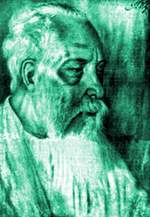
Om Ekamevadwiteeyam
Satyam jyanam anandam brahma
Anandarupam amritam yadivibhuti
Shantam shivam advaitam
Shuddham apapabiddham.
O, Supreme One,
Thou art the one without a second,
Thou art Brahma — the source of all truth, wisdom and happiness,
Thou art infinite, eternal, serene and pure.
Q1 What is the "Brahmo Samaj" ?
A1 The Brahmo Samaj is the social order ('Samaj' = "community") of the Brahmo religion. Though few may commit to the purity, metaphysical rigour and intellectual discipline of the Brahmo Religion, the number following its principles (ie. the Samaj) are legion.
Q2 Is Brahmoism a religion or a philosophy? Can one adopt Brahmoism whilst retaining one's current faith.
A2 Brahmoism is a religion. It is the newest of the 9 officially classified religions of India. The philosophy behind Brahmoism is 'Brahmo Dharma'. Any person who believes that there is only one infinite "God" can "follow" Brahmoism by subscribing to membership of a "Brahmo Samaj" while retaining their own religion.
Q3 How different is Brahmoism from the Brahmo Samaj? Also, I read somewhere that Brahmoism can only be acquired through heredity, while the Brahmo Samaj is open to everyone. Is that correct?
A3 Brahmoism is the religion. Brahmo Samaj is the larger community which "follows" Brahmoism while possibly retaining their old religions. It is incorrect that Brahmoism is hereditary. Genetics and Memetics simply reinforce the shared collective identity for Brahmoism (as in all religions).
.. Read more: Complete Brahmo Samaj FAQ
The Prime ('Adi') Principles of the Brahmo Religion are :-
There is always Infinite Singularity - immanent and transcendant Singular Author and Preserver of Existence - He who is manifest everywhere and in everything, in the fire and in the water, in the smallest plant to the mightiest oak.
Being is created from Singularity. Being is renewed to Singularity. Being exists to be one (again) with Loving Singularity.
Righteous actions alone rule Existence against Chaos. Knowledge of pure Conscience is the One ruler of Existence with no symbol or intermediary.
Respect all creations and beings but never venerate them for only Singularity can be loved.
** Brahmos define righteousness as the only way of life.
** Brahmos use truth, knowledge, reason, free will and virtuous intuition (observation) as guides.
** Brahmos embrace secular principles but oppose sectarianism and imposition of religious belief into governance (especially propagation of religious belief by government).
** Brahmos welcome the co-existence of Brahmo principles with governance, but oppose all governance in conflict with Brahmo principles.
** Brahmos reject narrow theism (epecially polytheism), idolatry, ascetism and symbolism.
** Brahmos reject the need for formal rituals, priests or places (church, temple, mosque) for worship.
** Brahmos reject dogma and superstition.
** Brahmos reject scripture as authority.
** Brahmos reject revelations, prophets, gurus, messiahs, or avatars as authority.
** Brahmos reject bigotry and irrational distinctions like caste, creed, colour, race, religion which divide beings.
** Brahmos reject all forms of totalitarianism.
** Brahmos question the prevalent notion of "sin".
** Brahmos question the prevalent notions of "heaven" or "hell".
** Brahmos question the prevalent notion of "salvation".


